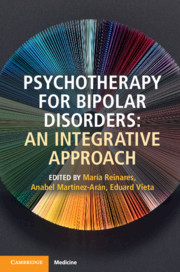Book contents
- Psychotherapy for Bipolar Disorders: An integrative approach
- Psychotherapy for Bipolar Disorders
- Copyright page
- Contents
- Collaborators
- Preface
- Part 1 An Introduction to Treatments
- Part 2 The Foundations of an Integrative Approach to Bipolar Disorders
- Chapter 2.1 Psychoeducation for Patients and Family Members
- Chapter 2.2 Promotion of a Healthy Lifestyle
- Chapter 2.3 Mindfulness
- Chapter 2.4 Cognitive and Functional Remediation
- Part 3 An Integrative Approach to Bipolar Disorders
- Book part
- Bibliography
- Index
Chapter 2.3 - Mindfulness
from Part 2 - The Foundations of an Integrative Approach to Bipolar Disorders
Published online by Cambridge University Press: 18 October 2019
- Psychotherapy for Bipolar Disorders: An integrative approach
- Psychotherapy for Bipolar Disorders
- Copyright page
- Contents
- Collaborators
- Preface
- Part 1 An Introduction to Treatments
- Part 2 The Foundations of an Integrative Approach to Bipolar Disorders
- Chapter 2.1 Psychoeducation for Patients and Family Members
- Chapter 2.2 Promotion of a Healthy Lifestyle
- Chapter 2.3 Mindfulness
- Chapter 2.4 Cognitive and Functional Remediation
- Part 3 An Integrative Approach to Bipolar Disorders
- Book part
- Bibliography
- Index
Summary
Stress is part of life. As discussed previously, some degree of stress can be stimulating to achieve certain goals. However, when the level of stress is maintained, the effects can be detrimental to health. Stress depends not only on the objective situation, but especially on factors related to how we interpret the situation and the resources we believe we have to deal with it. Faced with a stressful situation, the body undergoes a series of physiological reactions that involve the activation of the hypothalamic–pituitary–adrenal axis and the autonomic nervous system. What happens in the stress response is that a real or imagined problem causes the cerebral cortex to send an alarm to the hypothalamus, which then stimulates part of the nervous system to make a series of changes in the body. These include changes in the heart and breathing rates, muscle tension, metabolism and blood pressure, among others. The adrenal glands secrete corticoids which shut down processes such as digestion, growth, tissue repair and the responses of the immune system.
- Type
- Chapter
- Information
- Psychotherapy for Bipolar DisordersAn Integrative Approach, pp. 40 - 49Publisher: Cambridge University PressPrint publication year: 2019

